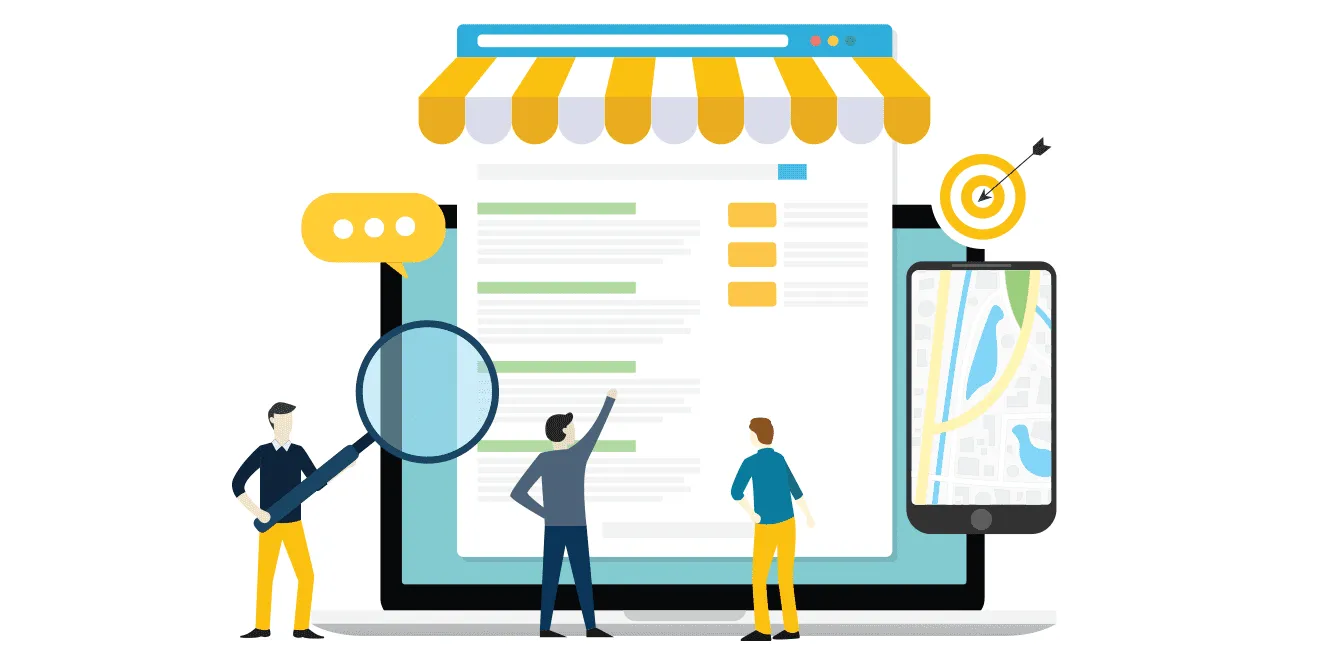In the heart of the Midwest, Indianapolis isn’t just known for its love of racing; it’s also revving up the engines of e-commerce businesses through powerful SEO services. As the digital landscape continues to evolve, the role of search engine optimization (SEO) in the success of online stores cannot be overstated. Whether you’re a well-established e-commerce brand or just starting your online journey, understanding the significance of SEO services in Indianapolis is your ticket to accelerated growth and sustained online visibility.
In this blog, we’ll explore the dynamic world of SEO services tailored specifically for e-commerce brands in Indianapolis. We’ll delve into the strategies, trends, and benefits that make investing in SEO an indispensable part of your digital marketing arsenal. Buckle up as we embark on a journey to unlock the secrets of conquering the e-commerce market in Indianapolis through the power of SEO.
The Importance of SEO for Ecommerce Brands

In the bustling world of e-commerce, where competition is just a click away, the significance of search engine optimization (SEO) cannot be overstated. It’s not just a marketing tactic; it’s a lifeline for e-commerce brands striving to thrive in the digital age. In this section, we’ll uncover why SEO is the cornerstone of success for online retailers and how it can make or break your e-commerce venture.
- Enhanced Visibility: Picture your e-commerce website as a hidden gem in a vast marketplace. Without SEO, it’s like having that gem buried beneath layers of dirt. SEO helps unearth your website and places it prominently in search engine results pages (SERPs). This heightened visibility ensures that potential customers find you when they search for products you offer.
- Increased Organic Traffic: Paid advertising can drive traffic, but organic traffic is the holy grail. SEO focuses on optimizing your website’s structure, content, and keywords, making it more appealing to search engines. The result? A steady stream of visitors who are genuinely interested in what you offer, without the constant need for advertising spend.
- Cost-Effective Marketing: Compared to traditional advertising methods, SEO offers a cost-effective way to reach your target audience. It’s an investment that keeps on giving, as the effects of good SEO can last for months or even years, providing ongoing value for your e-commerce business.
- Credibility and Trust: Websites that rank high in search results are often perceived as more credible and trustworthy by users. SEO not only improves your visibility but also helps build your brand’s reputation in the eyes of potential customers.
- Competitive Advantage: Your competitors are likely investing in SEO, and if you’re not, you’re falling behind. By optimizing your e-commerce site, you can stay ahead in the race, attract more customers, and gain a competitive edge.
- User Experience and Conversion Optimization: SEO isn’t just about keywords; it’s also about providing a better user experience. A well-optimized site loads faster, is mobile-friendly, and offers valuable content. These factors contribute to higher conversion rates, turning visitors into loyal customers.
- Insightful Data: SEO tools provide valuable insights into user behavior, preferences, and trends. This data can guide your marketing strategy, helping you make informed decisions to improve your e-commerce offerings.
- Adaptation to Changing Trends: The digital landscape evolves rapidly. SEO specialists stay updated with algorithm changes and trends, ensuring that your e-commerce site remains relevant and adaptable to shifting consumer behavior.
In summary, SEO isn’t just a choice; it’s a necessity for e-commerce brands aiming to thrive in the digital marketplace. It’s the engine that propels your online store forward, bringing you closer to your target audience and helping you achieve sustainable growth. In the next sections, we’ll explore how to harness the power of SEO services in Indianapolis specifically tailored for e-commerce success.
Choosing the Right SEO Agency in Indianapolis

Indianapolis is a city bustling with opportunities for businesses, including e-commerce ventures. To stand out in this competitive landscape, partnering with the right SEO agency is crucial. But how do you choose the perfect SEO agency in Indianapolis to help you achieve your e-commerce goals? Let’s dive into the essential considerations.
- Industry Experience: Look for an agency with a proven track record in working with e-commerce brands. Experience in your specific niche can make a significant difference in understanding your target audience and competition.
- Local Expertise: Indianapolis is a unique market, and local SEO knowledge is invaluable. An agency familiar with the city’s nuances, local search trends, and consumer behavior can give you a competitive edge.
- Client Portfolio: Review the agency’s client portfolio. Do they have success stories with e-commerce clients? Can they provide case studies or references? A solid portfolio indicates their ability to deliver results.
- Transparency: A trustworthy agency will be transparent about their methods and provide clear, regular reporting on your campaign’s progress. Be cautious of agencies that promise quick fixes or are unwilling to explain their strategies.
- Customized Strategies: Every e-commerce business is different. Your SEO agency should develop customized strategies tailored to your unique goals, challenges, and budget.
- Ethical Practices: Ensure the agency adheres to ethical SEO practices. Avoid those that engage in black-hat tactics, as they can lead to penalties from search engines that harm your online presence.
- Content Expertise: Content is a cornerstone of SEO. Check if the agency has a team of skilled writers and content creators who can produce high-quality, SEO-friendly content for your website.
- Technical SEO Proficiency: Technical SEO aspects, such as site speed, mobile optimization, and site structure, are critical. Your chosen agency should excel in these areas to improve user experience and search engine rankings.
- Results-Oriented: The primary goal of SEO is to drive tangible results, such as increased traffic, conversions, and revenue. Ensure the agency is focused on achieving these outcomes.
- Communication and Collaboration: Effective communication is key. Choose an agency that is responsive, listens to your concerns, and collaborates with your team to achieve shared objectives.
- Scalability: As your e-commerce business grows, your SEO needs may change. Ensure the agency can scale its services to meet your evolving requirements.
- Budget Alignment: While budget is an important factor, don’t choose an agency solely based on price. Focus on the value they can provide and the return on investment (ROI) you can expect.
- Reviews and Reputation: Read online reviews and testimonials from past clients. A reputable agency should have a positive online reputation and feedback from satisfied customers.
- Contracts and Terms: Carefully review the agency’s contracts and terms, including the duration of the engagement, termination clauses, and any hidden fees.
- Long-Term Vision: Seek an agency that has a long-term vision for your SEO strategy. Sustainable, white-hat practices can yield lasting results.
Choosing the right SEO agency in Indianapolis is a pivotal decision that can significantly impact your e-commerce business’s success. By conducting thorough research and considering these factors, you’ll be well-equipped to make an informed choice and embark on a successful SEO journey tailored to your brand’s unique needs.
Tailoring SEO Strategies for Ecommerce

Ecommerce websites require distinct SEO strategies tailored to their unique needs. Here’s a comprehensive guide on how to optimize your ecommerce site for search engines:
Keyword Research for Products: Identify high-converting keywords relevant to your products. Use keyword research tools to find search terms that potential customers are using. Create dedicated product pages optimized for specific keywords.
Product Titles and Meta Descriptions: Craft compelling and concise product titles that include target keywords. Write unique meta descriptions for each product to entice clicks from search engine results pages (SERPs).
Unique and Informative Product Descriptions: Write unique and detailed product descriptions that provide value to your customers. Avoid using manufacturer-provided content, as duplicate content can harm your SEO. Highlight the benefits and features of your products in a way that resonates with your target audience.
Image Optimization: Optimize product images by using descriptive file names and alt tags. This improves accessibility and helps search engines understand your images. Compress images to ensure fast page load times.
Site Structure and Navigation: Create a clear and logical site structure with well-defined product categories and subcategories. Implement breadcrumb navigation to enhance user experience and SEO.
Mobile Optimization: Ensure that your ecommerce site is mobile-responsive. A significant portion of online shopping happens on mobile devices. Optimize for mobile site speed to reduce bounce rates and improve rankings.
Schema Markup: Implement schema markup for products to provide search engines with structured data about your offerings. This can lead to rich snippets in search results, increasing click-through rates.
Customer Reviews and Ratings: Encourage customers to leave reviews and ratings for your products. Positive reviews can boost your credibility and SEO. Respond to customer reviews and engage with your audience to build trust.
SSL Security: Ensure your ecommerce website has an SSL certificate to secure customer data during transactions. Secure sites are favored by search engines and users alike.
Internal Linking: Use internal linking to connect related product pages and categories. This distributes link authority and improves navigation. Create a logical linking structure to enhance user experience.
Canonical Tags: Implement canonical tags to avoid duplicate content issues, especially if products appear in multiple categories or filters.
Structured Data for Reviews and Ratings: Utilize structured data markup to showcase product reviews and ratings in search results, increasing visibility and trust.
Mobile-First Indexing: Prioritize mobile optimization, as Google primarily uses the mobile version of your site for ranking and indexing.
Ecommerce SEO Tools: Leverage ecommerce-specific SEO tools and plugins available for your platform (e.g., Shopify, WooCommerce). These can simplify tasks like managing product feeds and optimizing meta tags.
Regular SEO Audits: Conduct regular SEO audits to identify and address technical issues, broken links, and other factors that could affect your rankings. Stay updated with search engine algorithm changes and adapt your strategies accordingly.
By customizing your SEO strategies for ecommerce, you can enhance your online store’s visibility, attract targeted traffic, and ultimately drive more sales and revenue. Keep optimizing, monitoring results, and adapting to industry trends to maintain your competitive edge.
On-Page Optimization Techniques for Ecommerce Sites

On-page optimization is a critical component of SEO for ecommerce websites. It involves optimizing individual pages on your site to improve their search engine rankings and enhance the user experience. Here are some effective on-page optimization techniques specifically tailored for ecommerce sites
- Keyword Research and Usage: Conduct thorough keyword research to identify relevant keywords for your products and categories. Strategically use these keywords in product titles, descriptions, meta tags, and headings. Maintain a natural tone in your content, avoiding keyword stuffing.
- High-Quality Product Descriptions: Craft unique, informative, and compelling product descriptions that highlight product benefits, features, and specifications. Avoid using duplicate content provided by manufacturers.
- Optimize Product Images: Use descriptive file names for product images and include relevant keywords. Add alt text to images to improve accessibility and help search engines understand the content. Compress images to ensure fast page loading times.
- Mobile-Friendly Design: Ensure your ecommerce site is fully responsive and provides an excellent user experience on mobile devices. Optimize for mobile site speed to reduce bounce rates and improve rankings.
- Clear and Logical Site Structure: Organize products into well-defined categories and subcategories. Implement breadcrumb navigation to help users and search engines understand the hierarchy of your site.
- Internal Linking: Create a logical internal linking structure to connect related product pages and categories. Use descriptive anchor text to improve navigation and distribute link authority.
- User-Generated Content: Encourage customers to leave reviews and ratings for your products. Respond to reviews and engage with your audience, as user-generated content can improve SEO and build trust.
- Schema Markup: Implement schema markup for products to provide search engines with structured data about your offerings. This can lead to rich snippets in search results, increasing click-through rates.
- Canonical Tags: Use canonical tags to prevent duplicate content issues, especially if products appear in multiple categories or filters. Specify the preferred URL to be indexed by search engines.
- Page Load Speed Optimization: Optimize your website for fast loading times, as slow-loading pages can lead to higher bounce rates and lower rankings. Minimize unnecessary JavaScript and CSS, and leverage browser caching.
- Secure Website (HTTPS): Ensure that your ecommerce site is secured with an SSL certificate. Google favors secure sites and may rank them higher.
- Structured Data for Reviews and Ratings: Utilize structured data markup to showcase product reviews and ratings in search results, increasing visibility and trust.
- Content Marketing: Develop a blog or resources section to publish informative and engaging content related to your products. Use content to target informational keywords and attract potential customers indirectly.
- Regular SEO Audits: Conduct regular SEO audits to identify and address technical issues, broken links, and other on-page factors that could affect your rankings.
- A/B Testing and Optimization: Continuously test and optimize product pages, including elements like call-to-action buttons, product images, and page layouts, to improve conversion rates.
By implementing these on-page optimization techniques, you can enhance the visibility of your ecommerce site in search engine results, attract more qualified traffic, and ultimately boost sales and revenue. Regularly monitor your site’s performance and adapt your strategies to stay competitive in the dynamic ecommerce landscape.
Off-Page SEO Strategies for Ecommerce Success

Off-page SEO is crucial for improving your ecommerce website’s authority, trustworthiness, and search engine rankings. These strategies focus on activities outside your website that influence your online reputation and visibility. Here are effective off-page SEO strategies tailored for ecommerce success
Link Building: Acquire high-quality backlinks from authoritative websites in your industry through guest posting, outreach, and content marketing.
Social Media Marketing: Create and maintain active social media profiles on platforms relevant to your audience. Share product updates, promotions, and engaging content to foster brand awareness and encourage social sharing.
Influencer Marketing: Collaborate with influencers in your niche to promote your products. Ensure influencer partnerships align with your brand and target audience.
Online PR and Brand Mentions: Build relationships with online publications, bloggers, and journalists who cover your industry. Encourage positive brand mentions and reviews, which can boost your site’s credibility.
Content Marketing: Produce valuable, shareable content that attracts links and social shares. Content formats can include blog posts, infographics, videos, and more.
Customer Reviews and Ratings: Encourage customers to leave reviews on third-party review platforms, such as Google My Business, Yelp, and Trustpilot. Positive reviews and ratings can enhance your online reputation and SEO.
Local SEO Optimization: If you have physical store locations, optimize your business listings on local directories and platforms. Ensure consistent NAP (Name, Address, Phone) information across all listings.
Community Engagement: Participate in online communities and forums related to your niche. Share your expertise, answer questions, and provide valuable insights.
Linkless Mentions and Brand Citations: Monitor online mentions of your brand, even if they don’t include hyperlinks. Encourage websites to add links to your site when mentioning your brand.
Online Partnerships: Collaborate with complementary businesses for cross-promotions, co-marketing efforts, and link exchanges. Be selective and ensure partnerships align with your brand values.
Ecommerce SEO Tools and Software: Use SEO tools and software to monitor backlinks, track mentions, and analyze competitor strategies. These tools can help you identify opportunities for improvement.
Content Syndication and Guest Blogging: Syndicate your content on reputable platforms to expand your reach. Contribute guest posts to authoritative websites in your industry with relevant backlinks.
Online Advertising: Invest in paid advertising campaigns, such as Google Ads and social media advertising, to increase brand visibility. Use PPC (Pay-Per-Click) campaigns strategically to attract potential customers.
Ecommerce Marketplaces: Leverage popular ecommerce marketplaces like Amazon, eBay, and Etsy to reach a wider audience. Optimize product listings on these platforms for better visibility and conversions.
Monitor and Respond to Online Reputation: Continuously monitor online reviews, mentions, and comments about your brand. Promptly respond to negative feedback and address customer concerns to maintain a positive online reputation.
Effective off-page SEO is an ongoing effort that requires building a strong online presence and reputation. By implementing these strategies, you can enhance your ecommerce website’s authority, trustworthiness, and search engine rankings, ultimately driving more traffic and sales.
Local SEO for Indianapolis Ecommerce Businesses

Local SEO is crucial for ecommerce businesses operating in specific geographic areas like Indianapolis. To enhance your local visibility and attract potential customers in the Indianapolis area, follow these strategies
Google My Business (GMB) Optimization: Claim and verify your Google My Business listings for all relevant physical locations in Indianapolis. Ensure accurate and consistent NAP (Name, Address, Phone number) information on GMB and across the web.
Local Keyword Optimization: Incorporate Indianapolis-specific keywords naturally into your website content, product descriptions, and meta tags to target local search queries. Consider using terms like “Indianapolis,” “near me,” and other location-specific phrases.
Online Directories and Citations: List your business on prominent local directories and citation websites such as Yelp, Yellow Pages, and Indianapolis-specific directories. Verify that your NAP details align with your GMB listing.
Local Content Creation: Develop content that resonates with the Indianapolis audience, such as blog posts, articles, or event announcements related to the local community. Highlight any Indianapolis-specific promotions or events on your website.
Customer Reviews and Ratings: Encourage customers to leave reviews and ratings on your Google My Business listing and other relevant review platforms. Engage with customer feedback, both positive and negative, to foster connections with the local community.
Local Link Building: Build relationships with other Indianapolis-based businesses and organizations. Explore opportunities for local backlinks, such as partnerships, sponsorships, or collaborations with local entities.
Mobile Optimization: Ensure your ecommerce website offers a seamless experience on mobile devices since many local searches occur on smartphones and tablets. Optimize for mobile site speed and usability.
Schema Markup for Local SEO: Implement schema markup to provide search engines with structured data about your business, including your Indianapolis location, hours of operation, and customer reviews.
Location Pages: Create dedicated location-specific pages on your website for each physical store or office located in Indianapolis. Customize these pages with unique content and specific NAP details for each location.
Social Media Engagement: Engage actively with the local Indianapolis community on social media platforms. Share local news, events, and promotions to connect with and inform local customers.
Online Advertising Geotargeting: Leverage geotargeting in online advertising campaigns to precisely target Indianapolis audiences. Utilize platforms like Google Ads and social media advertising for geographically specific targeting.
Regular Website Updates: Maintain up-to-date website information, including contact details, business hours, and product/service offerings, to ensure you provide accurate information to local customers.
By implementing these strategies, your Indianapolis-based ecommerce business can enhance its local SEO efforts, improve online visibility among local customers, and drive more traffic and sales within the city.
Measuring SEO Success for Ecommerce Brands

Measuring the success of your SEO efforts is essential to ensure that your ecommerce brand is on the right track and to identify areas for improvement. Here are key metrics and methods to measure SEO success for ecommerce brands
Organic Traffic: Monitor the overall organic traffic to your ecommerce site, tracking the number of visitors coming from search engines over time. Utilize Google Analytics or other analytics tools to analyze traffic trends.
Keyword Rankings: Keep an eye on the rankings of your target keywords in search engine results pages (SERPs). Track improvements or declines in keyword positions using SEO tools like SEMrush, Moz, or Ahrefs for keyword ranking data.
Click-Through Rate (CTR): Analyze the click-through rates for your organic search listings. High CTR indicates that your title tags and meta descriptions are compelling. Google Search Console provides CTR data for specific keywords.
Conversion Rate: Measure the conversion rate of organic traffic into actual sales or desired actions on your ecommerce site. Connect your ecommerce platform with Google Analytics or use ecommerce tracking tools to see how SEO traffic contributes to conversions.
Revenue from Organic Traffic: Determine the revenue generated from organic traffic. This metric directly ties SEO success to your bottom line. Compare it with other marketing channels to assess the ROI of your SEO efforts.
Bounce Rate and Dwell Time: Monitor the bounce rate (percentage of visitors who leave your site after viewing only one page) and dwell time (the time visitors spend on your site). Low bounce rates and longer dwell times indicate engaging content and a positive user experience.
Return on Investment (ROI): Calculate the ROI of your SEO campaigns by comparing the cost of SEO efforts to the revenue generated from organic traffic. Consider both short-term and long-term ROI.
Mobile Performance: Assess how your site performs on mobile devices, as mobile-friendliness is a critical SEO factor. Analyze mobile-specific metrics such as mobile traffic, mobile CTR, and mobile conversion rates.
Page Load Speed: Check the page load speed of your site, especially on mobile devices. Slow-loading pages can lead to higher bounce rates and lower rankings. Use tools like Google PageSpeed Insights to identify and address speed issues.
Indexation and Crawl Errors: Ensure that search engines are indexing your site correctly and that there are no crawl errors preventing bots from accessing important pages. Google Search Console provides valuable data on indexation and crawl issues.
User Engagement Metrics: Analyze user engagement metrics like pages per session, session duration, and exit pages to understand how visitors interact with your site. Optimize user experience to improve these metrics.
Link Profile and Authority: Monitor the growth of your backlink profile and domain authority. Quality backlinks from authoritative sites contribute to SEO success. SEO tools can help you track backlinks and domain authority over time.
Ecommerce-Specific Metrics: Focus on ecommerce-specific metrics such as product page views, add-to-cart rates, and cart abandonment rates. These metrics help you assess the performance of your product pages in search results.
Competitor Analysis: Compare your SEO metrics with those of your competitors to identify areas where you can improve and gain a competitive edge.
Measuring SEO success for ecommerce brands involves a comprehensive analysis of various metrics that impact your online visibility, traffic, and revenue. Regularly track these metrics, set realistic goals, and adjust your SEO strategies accordingly to achieve long-term success.
Conclusion: Elevate Your Ecommerce Brand with SEO in Indianapolis
In conclusion, harnessing the power of SEO for your ecommerce brand in Indianapolis can be a game-changer. This dynamic digital marketing strategy is essential for enhancing your online visibility, attracting a targeted audience, and ultimately boosting sales and revenue. Here’s a recap of key takeaways to elevate your ecommerce brand with SEO in Indianapolis:
- SEO’s Crucial Role: SEO is not an option but a necessity in the highly competitive ecommerce landscape. It ensures that your products and services are discoverable by potential customers in Indianapolis and beyond.
- Local SEO Emphasis: For Indianapolis-based ecommerce businesses, local SEO is paramount. Optimize your website, content, and listings to appear prominently in local search results.
- Tailored Strategies: Customize your SEO strategies to align with the unique needs of ecommerce, focusing on product descriptions, mobile optimization, and schema markup.
- On-Page Optimization: Optimize individual product pages with relevant keywords, high-quality content, and image optimization to enhance user experience and search engine rankings.
- Off-Page Strategies: Leverage off-page SEO techniques like link building, social media marketing, and online PR to boost your ecommerce brand’s authority and reputation.
- Measure Success: Regularly track and analyze key SEO metrics, including organic traffic, keyword rankings, conversion rates, and revenue, to measure the success of your efforts.
- Stay Competitive: Keep an eye on competitors and adapt your SEO strategies to stay ahead in the ever-evolving ecommerce landscape.
By implementing these strategies and continually optimizing your SEO efforts, your Indianapolis ecommerce brand can reach new heights, connect with local customers, and achieve sustainable growth. Remember that SEO is an ongoing journey, and the rewards it offers are well worth the investment.



